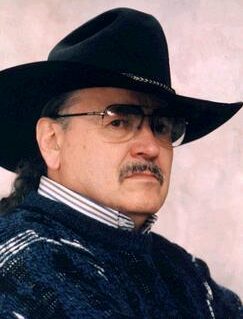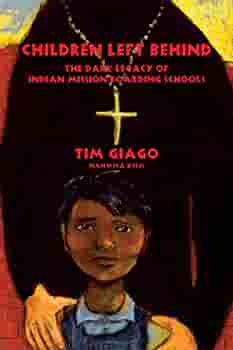Originally published July 24, 2022
Homepage photo by Don Doll S.J., 1994
Support Journal-isms
(Click for Journal-isms fund-raising drive, underway on Facebook and GoFundMe)
Doris Giago, Tim Giago’s ex-wife and Lakota Times co-founder, said investigations by the newspaper “caused banks to be fined and rip-offs of the tribal government to be halted … Lakota Times proved that freedom of the press could not only succeed in Indian Country but that it can make a major difference in the way news is covered on the Indian reservations of America,” ICT reported. (Credit: YouTube, 2016)
Co-Founded Native American Journalists Association
When shootings took place at the Pulse night club in Orlando in 2016 and at an outdoor country music concert in Las Vegas in 2017, many in the mass media — lacking Native American representation — dubbed the tragedies “the nation’s deadliest mass shooting” or the “worst mass shooting in U.S. history.”
But when Journal-isms asked Tim Giago, dean of Native American journalists, if that were the case, he produced a list of 18 massacres that were deadlier that involved Native Americans, including the infamous Battle of Wounded Knee in 1890.
In 2014, when George Zimmerman was acquitted in the shooting death of Black teenager Trayvon Martin, and seemingly the whole United States was abuzz, the annual conference of the Native American Journalists Association was discussing other things. “We have our own system of injustice, and we’ve been living it for 100 years,” Giago, Oglala Lakota, the founding president of NAJA, explained to Journal-isms.
Giago died Sunday in Rapid City, S.D., at 88. A GoFundMe page created for him on June 24 said he had undergone “several surgeries and needs to renovate his home to make it handicapped accessible.”
His former wife, Doris Giago, said he had cancer and complications related to diabetes, according to Jourdan Bennett-Begaye and Mary Annette Pember, writing for ICT, formerly Indian Country Today.
Giago was to be inducted into the National Native American Hall of Fame in November, one of many accolades.
 The iconic journalist was described there as “the founder and publisher of The Lakota Times, Indian Country Today, The Lakota Journal, and Native Sun News. He founded the Native American Journalists Association (NAJA) and served as its first president. He was instrumental in convincing Gov. George Mickelson to proclaim a Year of Reconciliation in 1990 and led the fight to make Oct. 12 Native American Day in South Dakota. He was the first Native American inducted into the South Dakota Newspaper Hall of Fame (pictured, 1994) and has received many journalism awards, including the H. L. Mencken Award in 1985.”
The iconic journalist was described there as “the founder and publisher of The Lakota Times, Indian Country Today, The Lakota Journal, and Native Sun News. He founded the Native American Journalists Association (NAJA) and served as its first president. He was instrumental in convincing Gov. George Mickelson to proclaim a Year of Reconciliation in 1990 and led the fight to make Oct. 12 Native American Day in South Dakota. He was the first Native American inducted into the South Dakota Newspaper Hall of Fame (pictured, 1994) and has received many journalism awards, including the H. L. Mencken Award in 1985.”
Giago’s former colleague, Tom Lawrence, wrote Sunday for the South Dakota Standard, “Tim first gained statewide attention when he wrote a column, Notes from Indian Country, that the Rapid City Journal first published in 1979. He later worked as a reporter for the Journal, and wrote columns for years for it and for The Argus Leader in Sioux Falls, as well as other papers. He also was published in The Huffington Post, a national political blog.”
Giago’s byline sometimes included his Oglala Lakota name, Nanwica Kciji, which translates to “He Stands up for Them “or “The Defender.” He loved journalism, retiring only to once again get back in the game. A Nieman fellow in 1990, Giago did not spend all his time explaining Native issues to non-Natives, but did try to put them in a context they could understand.
In 2019, when then-Virginia Gov. Ralph Northam was being excoriated when Northam was discovered to have worn blackface in his medical school yearbook, Giago wrote, “this week we see the media, politicians and African Americans all over America calling for Governor Northam to step down because he had the audacity to wear blackface while totally ignoring the many years of Native American protesting against the white people for wearing ‘redface.’ Please tell me, what in the hell is the difference?”
Giago’s death came as Pope Francis “began a fraught visit to Canada on Sunday to apologize to Indigenous peoples for abuses by missionaries at residential schools,” in the words of the Associated Press.
Of those abuses, ICT wrote Sunday, referring to Giago, “ICT’s national correspondent Mary Annette Pember interviewed him about his time as a student at Holy Rosary Indian boarding school (now named Red Cloud School) on the Oglala Lakota nation in South Dakota.
“Irascible and sharp as a tack, he was quick to criticize the current mainstream coverage of Indian boarding schools.
“ ‘Reporters need to speak directly with survivors who attended these schools rather than relying on secondhand information,’ he told ICT.
“Giago described digging a grave for his childhood friend Bozo Richards who died at age 16 from an ear infection at Holy Rosary.
“He also shared memories of how his little sister was raped by a school janitor and the scores of his classmates who died from alcohol and drug addiction that he believes was exacerbated by traumatic experiences at the school.
 “Long before the topic surfaced in the national media Giago was writing about his experiences at Holy Rosary in a 2006 book, ‘Children Left Behind: The Dark Legacy of Indian Mission Boarding Schools‘ (pictured).
“Long before the topic surfaced in the national media Giago was writing about his experiences at Holy Rosary in a 2006 book, ‘Children Left Behind: The Dark Legacy of Indian Mission Boarding Schools‘ (pictured).
“Giago took a lot of heat over the book both from Catholic leaders as well as his own people but in typical fashion, he stuck to his guns, refusing to sugarcoat or walk back any of his reporting. . . .”
Giago took press freedom seriously, and cited that as one reason he started another newspaper, Native Sun News, after selling Indian Country Today. He messaged Journal-isms in 2017, “I owned Indian Country Today for 18 years and was hugely successful because it covered all 9 reservations in SD [South Dakota]. After 18 years with never a vacation, working 7 days a week with no time off, I was just burned out. I sold the paper to the Onieda in 1999. Worst mistake I ever made.
“In the 18 years I owned Indian Country Today I fought tooth and nail for freedom of expression and press in Indian Country. One of the first moves the Oneida made was to stifle and censure that freedom. They fired two of my top writers for disagreeing with them, Brenda Norrell and Delphine Red Shirt, and then refused to print any letter [or] column critical of the paper or the tribe. When I sold the paper I sold the freedom of expression I had fought so hard to attain and retain.
“I assumed erroneously that since the Oneida were a very progressive tribe that they would not behave as all of the other tribes that did not practice freedom of the press in their own tribal newspapers. That is why I started an independent newspaper because there was no freedom of the press in Indian country until I challenged and changed it.”
The Oneida Nation-owned Indian Country Today went on an indefinite “hiatus” on Sept. 4, 2017. The Oneidas later donated it to the National Congress of American Indians, and the publication came back as a nonprofit organization that attracts over 400,000 readers a month, while broadcasting on television to two dozen stations, as Steve Dubb reported last year for Nonprofit Quarterly.
Last October, Giago told Kevin Wooster of South Dakota Public Radio why he continued his column. “There’s so damn much to write about and so little time to write. There’s something happening all the time that needs to be mentioned, and something good in Indian Country that I know nobody will write about if I don’t.”
- Tim Giago, HuffPost: Remembering the Great Native American Journalists (2014)
To subscribe at no cost, please send an email to journal-isms+subscribe@groups.io and say who you are.
Facebook users: “Like” “Richard Prince’s Journal-isms” on Facebook.
Follow Richard Prince on Twitter @princeeditor
Richard Prince’s Journal-isms originates from Washington. It began in print before most of us knew what the internet was, and it would like to be referred to as a “column.” Any views expressed in the column are those of the person or organization quoted and not those of any other entity. Send tips, comments and concerns to Richard Prince at journal-isms+owner@
View previous columns (after Feb. 13, 2016).
View previous columns (before Feb. 13, 2016)
- Diversity’s Greatest Hits, 2018 (Jan. 4, 2019)
- Book Notes: Is Taking a Knee Really All That? (Dec. 20, 2018)
- Book Notes: Challenging ’45’ and Proudly Telling the Story (Dec. 18, 2018)
- Book Notes: Get Down With the Legends! (Dec. 11, 2018)
- Journalist Richard Prince w/Joe Madison (Sirius XM, April 18, 2018) (podcast)
- Richard Prince (journalist) (Wikipedia entry)
- February 2018 Podcast: Richard “Dick” Prince on the need for newsroom diversity (Gabriel Greschler, Student Press Law Center, Feb. 26, 2018)
- Diversity’s Greatest Hits, 2017 — Where Will They Take Us in the Year Ahead?
- Book Notes: Best Sellers, Uncovered Treasures, Overlooked History (Dec. 19, 2017)
- An advocate for diversity in the media is still pressing for representation, (Courtland Milloy, Washington Post, Nov. 28, 2017)
- Morgan Global Journalism Review: Journal-isms Journeys On (Aug. 31, 2017)
- Diversity’s Greatest Hits, 2016
- Book Notes: 16 Writers Dish About ‘Chelle,’ the First Lady
- Book Notes: From Coretta to Barack, and in Search of the Godfather
- Journal-isms’ Richard Prince Wants Your Ideas (FishbowlDC, Feb. 26, 2016)
- “JOURNAL-ISMS” IS LATEST TO BEAR BRUNT OF INDUSTRY’S ECONOMIC WOES (Feb. 19, 2016)
- Richard Prince with Charlayne Hunter-Gault, “PBS NewsHour,” “What stagnant diversity means for America’s newsrooms” (Dec. 15, 2015)
- Book Notes: Journalists Follow Their Passions
- Book Notes: Journalists Who Rocked Their World
- Book Notes: Hands Up! Read This!
- Book Notes: New Cosby Bio Looks Like a Best-Seller
- Journo-diversity advocate turns attention to Ezra Klein project (Erik Wemple, Washington Post, March 5, 2014)
When you shop @AmazonSmile, Amazon will make a donation to Journal-Isms Inc. https://t.co/OFkE3Gu0eK
— Richard Prince (@princeeditor) March 16, 2018
Page views: 312 on July 26, 2022

